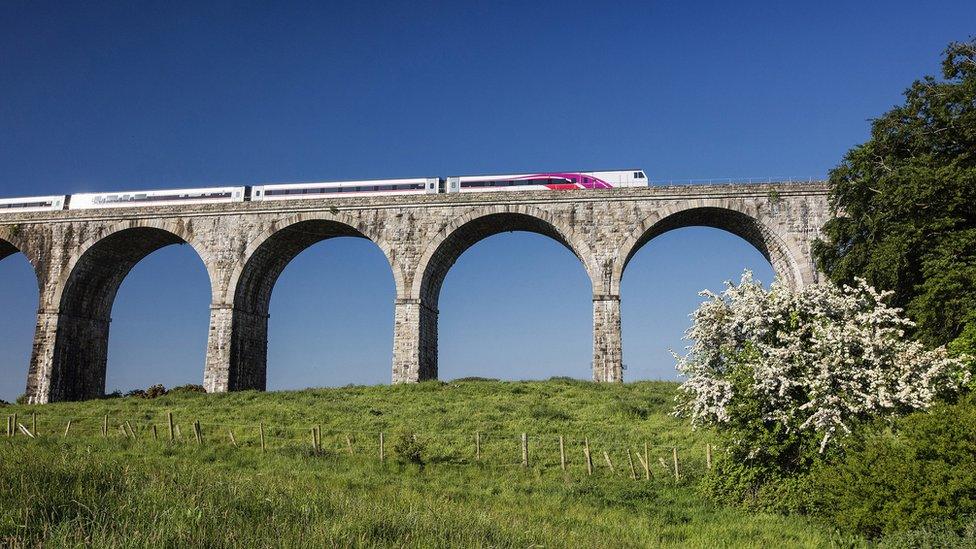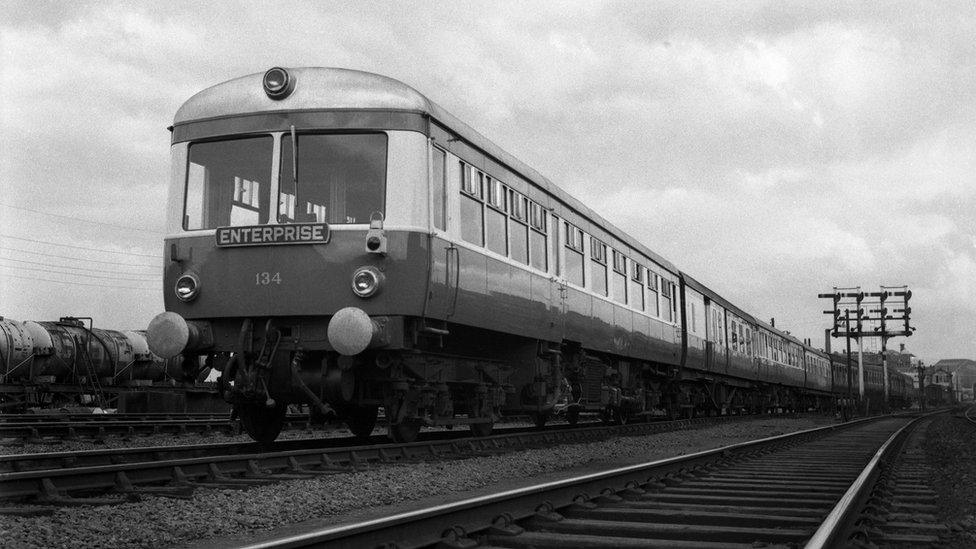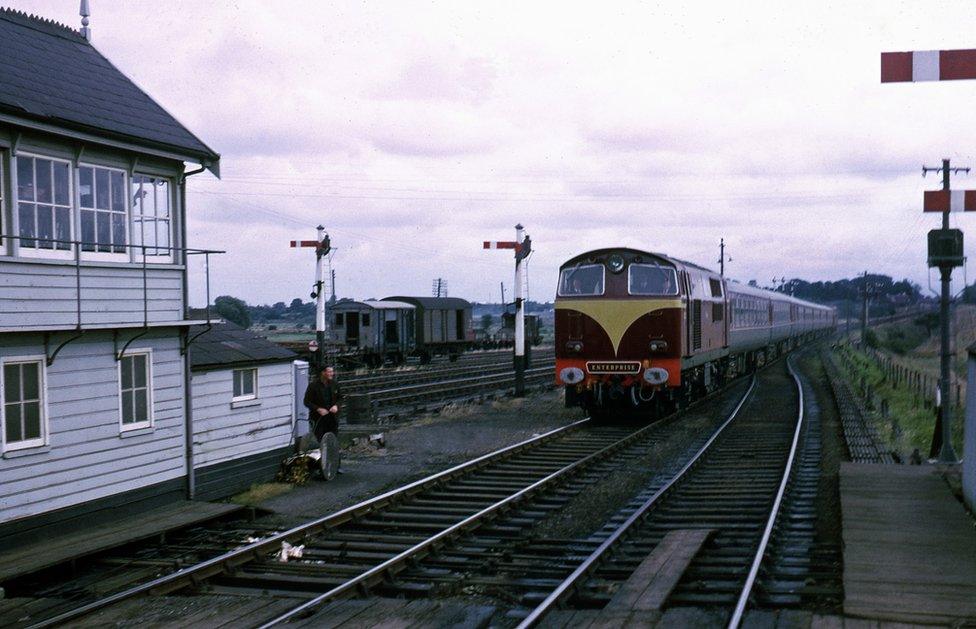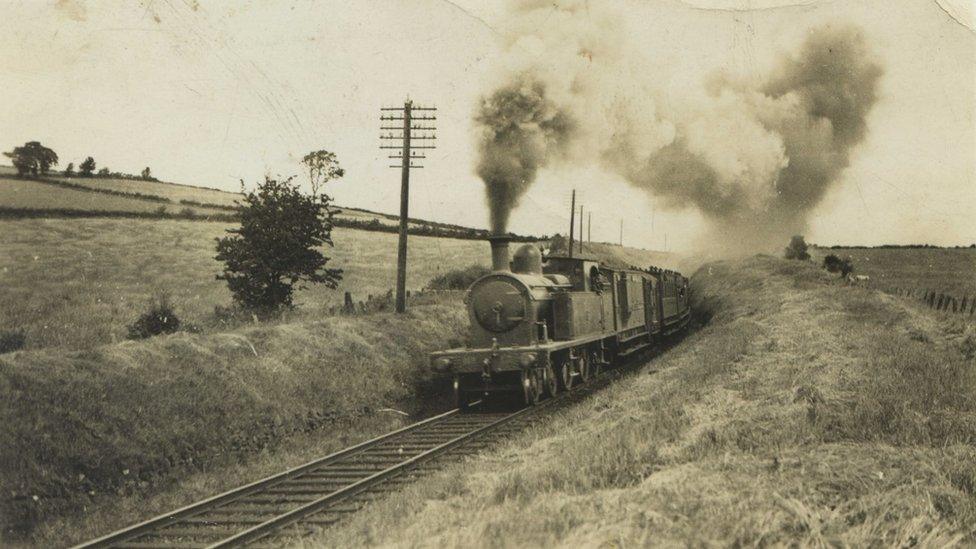Enterprise rail link between Belfast and Dublin marks 75 years
- Published
Enterprise train service's 75 years: Customs, comedy and contraceptives
It is 75 years since the start of the express rail link between Belfast and Dublin known as the Enterprise service.
It began in August 1947 to try to compete with the improving road network and the prospect of an air link between the two cities.
There have been many changes to the inter-city train link in the past 75 years.
The service survived frequent disruption in the 1970s and 1980s after violence erupted in Northern Ireland.
The current journey time on the 110-mile (177km) route is just over two hours, not much faster than when the non-stop Enterprise began in 1947.
However, there are now more stops.
'Ambitious plans'
The service is jointly run by Translink NI Railways in Northern Ireland and Iarnród Éireann (Irish Rail) in the Republic of Ireland.
Translink chief executive Chris Conway said: "Enterprise has been there to connect us to family, friends and opportunity, evolving with the times and better connecting Belfast and Dublin."

The Craigmore viaduct near Newry is one of the eye-catching features along the 110-miles route
He said there were "ambitious plans" to develop the service in the next decade.
The first Enterprise was a seven-carriage steam train which left Belfast at 10:30am on 11 August 1947.
A return train left Dublin at 5:30pm.
The trains had customs checks at either end, rather than stopping at points on either side of the border, which quickened the journey.
There was a dining car and a first-class carriage.
In 1947 there was only one daily return service - now there are eight on weekdays.

Rail bosses say the Enterprise has been a crucial economic and social link between Northern Ireland and the Republic of Ireland
A display of photographs from the past 75 years is going on display in Belfast at the Lanyon Place station and in Dublin's Connolly station.
Iarnród Éireann chief executive Jim Meade, said: "The Enterprise train is a key economic and social connector for the people of Dublin, Belfast and the stations in between and we look forward to another 75 years of its successful operation."
From campaigns to Covid
The most testing period for the service was during the years of violence in Northern Ireland when security alerts were common and the IRA attacked the cross-border rail line.
At the same time the rail link between Belfast and Dublin was used as part of efforts to end the violence by campaigners who organised Dublin-to-Belfast "Peace Trains".
In the early 1970s the rail link was used by campaigners who wanted the legalisation of contraception in the Republic.
Representatives from the Irish Women's Liberation Movement travelled north to try to buy contraceptives in Belfast.

Photographs of the Enterprise trains through the decades will be displayed in Belfast and Dublin
Over the years the train fleet has been upgraded as have the services on board, including the introduction of wifi and charging points.
In August 2009 a 20-metre (66ft) section of the track in north Dublin gave way at the Broadmeadow estuary viaduct.
For three months the number of cross-border services was reduced and passengers were bussed between Drogheda and Dublin.
Although the Enterprise began as a non-stop service it now has a small number of stops including Newry and Dundalk.
The Covid-19 pandemic led to a sudden drop in passengers and services in 2020 but numbers have grown rapidly in recent months.
Translink said passenger numbers were now higher than before the pandemic.
- Published16 May 2021
